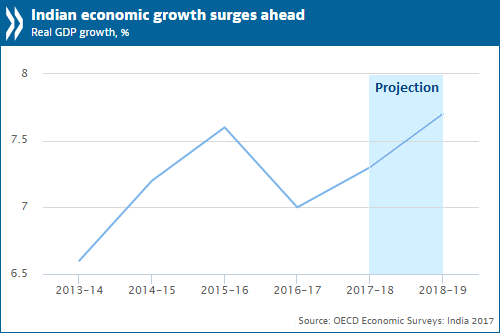India: Strong growth has raised incomes and reduced poverty, but challenges remain
The Indian economy is expanding at a fast pace, boosting living standards and reducing poverty nationwide. Further reforms are now necessary to maintain strong growth and ensure that all Indians benefit from it, according to a new report from the OECD.

The latest OECD Economic Survey of India finds that the acceleration of structural reforms and the move toward a rule-based macroeconomic policy framework are sustaining the country’s longstanding rapid economic expansion.
The Survey, presented in New Delhi by OECD Secretary-General Angel Gurría and India’s Secretary Economic Affairs Shaktikanta Das, hails India’s recent growth rates of more than 7 percent annually as the strongest among G20 countries. It identifies priority areas for future action, including continuing plans to maintain macroeconomic stability and further reduce poverty, additional comprehensive tax reforms and new efforts to boost productivity and reduce disparities between India’s various regions.
“India provides a welcome counter-point to a global economy that has been under-performing for years”, Mr Gurría said. “Reforms are historic and are bearing fruit, growth is strong and other macroeconomic indicators are improving. Maintaining the reform momentum will be critical to boosting investment and creating the quality jobs needed to ensure strong and inclusive growth for future generations, with all segments of society benefitting from it.”
The implementation of the landmark GST (Goods and Services Tax) reform will contribute to making India a more integrated market. By reducing tax cascading, it will boost competitiveness, investment and job creation. The GST reform - designed to be initially revenue-neutral - should be complemented by a reform of income and property taxes, the Survey said.
The Survey points out the need to make income and property taxes more growth-friendly and redistributive. A comprehensive tax reform could help raise revenue to finance much-needed social and physical infrastructure, promote corporate investment, enable more effective redistribution and strengthen the ability of states and municipalities to better respond to local needs, according to the Survey.
The OECD points out that achieving strong and balanced regional development will also be key to promoting inclusive growth. Inequality in income and in access to core public services between states and between rural and urban areas is currently large across India, while rural poverty is pervasive. Continuing efforts to improve universal access to core public services is essential.
Recent changes in India’s federalism model have given states more freedom and incentives to modernise regulations and tailor public policies to local circumstances. Ranking states on the ease of doing business is opening a new era of structural reforms at the state level and will help unleash India’s growth potential. Further benchmarking among states and strengthening the sharing of best practices, particularly on labour regulations and land laws, could add to the reform momentum.
Raising living standards in poorer states will require increasing productivity in the agricultural sector. With employment expected to gradually shift away from the agricultural sector, urbanisation will gather pace. Thus, better urban infrastructure will be needed to fully exploit cities’ potential for job creation, productivity gains and improving the quality of life.
Source: Organization for Economic Co-operation and Development
- 324 reads
Human Rights
Fostering a More Humane World: The 28th Eurasian Economic Summi

Conscience, Hope, and Action: Keys to Global Peace and Sustainability

Ringing FOWPAL’s Peace Bell for the World:Nobel Peace Prize Laureates’ Visions and Actions

Protecting the World’s Cultural Diversity for a Sustainable Future

Puppet Show I International Friendship Day 2020

